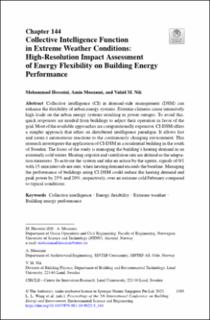Collective Intelligence Function in Extreme Weather Conditions: High-Resolution Impact Assessment of Energy Flexibility on Building Energy Performance
Chapter
Published version
Permanent lenke
https://hdl.handle.net/11250/3092925Utgivelsesdato
2023Metadata
Vis full innførselSamlinger
Sammendrag
Collective intelligence (CI) in demand-side management (DSM) can enhance the flexibility of urban energy systems. Extreme climates cause intensively high loads on the urban energy systems resulting in power outages. To avoid this, quick responses are needed from buildings to adjust their operation in favor of the grid. Most of the available approaches are computationally expensive. CI-DSM offers a simpler approach that relies on distributed intelligence paradigm. It allows fast and (semi-) autonomous reactions to the continuously changing environment. This research investigates the application of CI-DSM in a residential building in the south of Sweden. The focus of the study is managing the building’s heating demand in an extremely cold winter. Heating setpoint and ventilation rate are defined as the adaptation measures. To activate the system and take an action by the agents, signals of 0/1 with 15-min intervals are sent, when heating demand exceeds the baseline. Managing the performance of buildings using CI-DSM could reduce the heating demand and peak power by 25% and 20%, respectively, over an extreme cold February compared to typical conditions. Collective Intelligence Function in Extreme Weather Conditions: High-Resolution Impact Assessment of Energy Flexibility on Building Energy Performance
